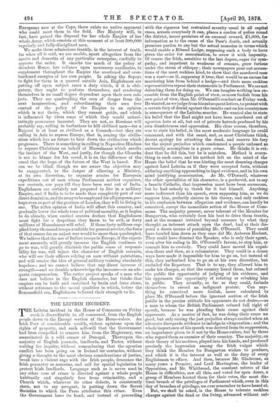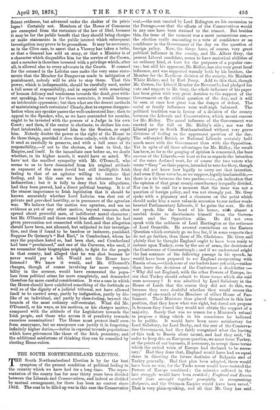THE LEITRIM INCIDENT.
THE Leitrim incident in the House of Commons on Friday week is discreditable to all concerned, from the English people down to the Enrage section of the Home-rulers. An Irish Peer of considerable wealth, violent opinions upon the rights of property, and such self-will that the Government had been compelled to remove him from the Magistracy, was assassinated in a wild corner of Donegal. Thereupon the majority of English journals, landlords, and Tories, without waiting for inquiry, without remembering that the agrarian conflict has been going on in Ireland for centuries, without giving a thought to the most obvious considerations of justice, break into a violent rage with the Irish people, denounce the Irish peasantry as assassins, and call for special legislation to protect Irish landlords. Language such as is never used in any other case of crime is directed against a whole people habitually and singularly free from criminality, and a Church which, whatever its other defects, is consistently stern, not to say arrogant, in putting down the Secret Societies to which the Press attributes this crime. Even the Government loses its head, and instead of proceeding with the vigorous but restrained severity usual in all capital cases, arrests everybody it can, places a cordon of police round the district, issues promises of an unusual reward, £1,000, for information as to the cause of the Peer's death, and actually promises pardon to any but the actual assassins in terms which would enable a Riband Lodge, supposing such a body to have given the order for assassination, to avow it with impunity. Of course the Irish, sensitive to the last degree,eager for sym- pathy, and impatient to weakness of censure, grow furious under the storm of obloquy ; their newspapers pour out accusa- tions of the most reckless kind, to show that the murdered man was a roué—as if, supposing it true, that would be an excuse for murdering him from behind a hedge—and their more reckless representatives repeat their statements in Parliament. We are not defending them for doing so. We can imagine nothing less ex- cusable from the English point of view, or more foolish from his own point of view, than Mr. O'Donnell's conduct on Friday week. He wanted, as we judge from his subsequent letters, to protest witk a certain fury of denial against the insults cast on his countrymen in consequence of the Leitrim murder. He wanted also to state his belief that the Earl might not have been murdered out of agrarian hate at all, but out of private hatreds produced by his own dissoluteness and oppression. His clear course, therefore, was to state his belief, in the most moderate language he c,on1r1 command, and with the usual, and, as most Christians think, decent apology for attacking the dead, and reserve his fury for the unjust prejudice which condemned a people unheard as universally accomplices in a grave crime. He thinks it is evi- dent that he did this, but. he is mistaken. Method is every- thing in such cases, and his method left on the mind of the House the belief that he was hinting the most damning charges against Lord Leitrim as if they were accepted facts, without adducing anything approaching to legal evidence, and in his own mind justifying assassination. As Mr. O'Donnell, whatever the other specialities of his character, is a perfervid, not to say a fanatic Catholic, that impression must have been erroneous, but he had nobody to thank for it but himself. Anything more indiscreet than his speech, even supposing him, as we do suppose him, perfectly sincere in his theory, and only reckless in his confusion between allegation and evidence, can hardly be conceived, except the immediate action of the House of Com- mons. The majority present, never tolerant of the Member for Dungarvan, who certainly does his best to drive them frantic, and at the moment irritated beyond measure by what they thought an indecent attack upon the dead, had at their dis- posal a dozen means of punishing Mr. O'Donnell. They could have howled him down as they once did Mr. Anberon Herbert. They could have directed the Speaker, who is only their agent, even after his ruling in Mr. O'Donnell's favour, to stop him, or commit him to custody: They could have moved his expul- sion there and then, as a calumniator. They could in a dozen ways have made it impossible for him to go on, but instead of this, they authorised him to go on at his own discretion, but excluded the Reporters. That is to say, they allowed him to make his charges, so that the country heard them, but refused the public the opportunity of judging of his evidence, and his opponents the opportunity of refuting or rebuking him in public. They actually, so far as they could, forbade themselves to record an indignant protest. Can any- thing he conceived more foolish, more calculated to place Mr. O'Donnell before the ignorant section of the Irish public in the precise attitude his opponents do not desire,—as a man to whom the British Parliament refused full right of speech, because he was pleading their cause against their oppressors. As a matter of fact, he was doing their cause no good, but only raising the just prejudice always excited when an advocate disregards evidence to indulge in vituperation ; and the whole importance of his speech was derived from its suppression, an importance given to it not by the Home-rulers, but by those who regard them as enemies of their country. The majority, on their theory of his motives, played into his hands, and produced precisely the impression among the Irish vulgar which they think the Member for Dungarvan wishes to produce, and which it is the interest as well as the duty of every Englishman to efface. And then, because Mr. Gladstone, so many years a Premier, and Lord Harlington, the leader of Opposition, and Mr. Whitbread, the constant referee of the House in difficulties, saw all this, and voted for open doors, a group of Members hooted them for their votes, the most dis- tinct breach of the privileges of Parliament which, even in this day of breaches of privilege, we ever remember to have heard of.
But, we shall be asked, is the House to tolerate reckless charges against the dead or the living, advanced without suf-
ficient evidence, but advanced under the shelter of its privi- I leges ? Certainly not. Members of the House of Commons are exempted from the restraints of the law of libel, because it may be for the public benefit that they should bring charges or make statements in the public interest which subsequent investigation may prove to be groundless. It may be necessary, as in the Clive case, to assert that a Viceroy has taken a bribe, or that a General has sold an army, or that a Minister is of a character which disqualifies him for the service of the Crown, and a member is therefore invested with a privilege which, after all, is allowed also to every advocate in the Courts. If counsel for the accused in the Leitrim case make the very same state- ments that the Member for Dungarvan made in mitigation of punishment, nobody will be able to stop them. That this power, which is indispensable, should be carefully used, under a full sense of responsibility, and in especial with something of human delicacy and tenderness towards the dead, goes with- out speaking, for except for those restraints, it would become an intolerable oppression; but then what are the decent methods of maintaining such restraints? Clearly,first to express disappro- bation when any speaker passes the well-understood line; then to appeal to the Speaker, who, as we have contended for months, ought to be invested with the powers of a Judge in his own Court ; and then, if the orator is obstinate, to declare his con- duct intolerable, and suspend him for the Session, or expel him. Nobody doubts the power or the right of the House to do these things, provided it does them calmly, with the dignity it used so carefully to preserve, and with a full sense of its responsibility,—if not to the electors, at least to God, the Empire, and itself. In the immediate case before us, we doubt whether, in its higher moods, it would have so acted. We have" not the smallest sympathy with Mr. O'Donnell, who seems to us to have descended from his original attitude as exponent of the more fervid but still intelligible Irish feeling to that of an agitator willing to irritate that feeling, and in this case we have no tolerance for his indiscretion ; but it is folly to deny that his allegations, had they been proved, had a direct political bearing. It is of the utmost importance to Irish legislation that it should be known accurately whether Lord Leitrim was shot out of private and provoked hostility, or in pursuance of the agrarian war. We believe that the motive was agrarian, and see no evidence as yet of any other motive, beyond rumours, often spread about powerful men, of indifferent moral character ; but Mr. O'Donnell and those round him affirmed that he had given provocation not connected with land, and that allegation should have been, not silenced, but subjected to fair investiga- tion, and then if found to be baseless or insincere, punished. Suppose De Quineey's "Bad Earl," in Cumberland, whom he says the populace hated so, had been shot, and Cumberland had been "proclaimed," and one of the Curwens, who used, if we remember their biographies aright, to fight for the people in that county, had alleged that he was shot because he never would pay a bill. Would not the House have listened? We know it would, and Mr. O'Donnell's charges, though of course involving far more responsi- bility in the accuser, would have exonerated the popu- lace from political crime far more completely, and demanded therefore far more careful consideration. It was a case in which the House should have exhibited something of the fortitude as well as of the dignity of a judicial tribunal, not have allowed itself to be carried away, partly by indignation, partly by dis- like of an individual, and partly by class-feeling, beyond the bounds of the most ordinary self-restraint. What did Mr. O'Donnell, or his ways, or his motives, or his charges matter, compared with the attitude of the Legislature towards the Irish people, and those who accuse it of proclivity towards causeless assassination? The House must protect itself even from annoyance, but no annoyance can justify it in forgetting infinitely higher duties,—duties in especial towards populations which have grievances like those of the Irish peasantry, and the additional misfortune of thinking they can be remedied by electing Home-rulers.



































 Previous page
Previous page